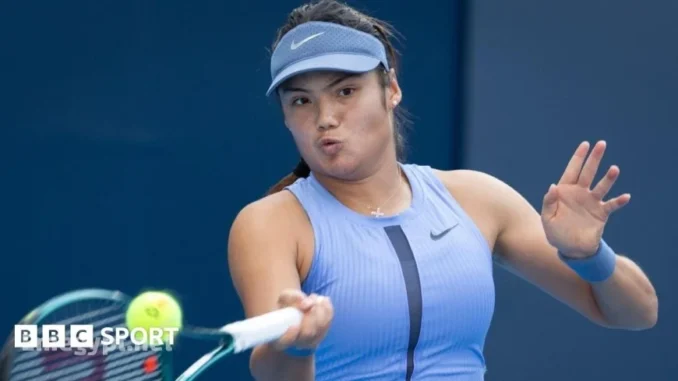
In the pulsating heart of Beijing’s Diamond Court, where the hum of anticipation filled the crisp autumn air, Emma Raducanu stood tantalizingly close to a career-defining moment. The 22-year-old British No. 1, ranked world No. 54, faced off against Jessica Pegula, the formidable American fifth seed, in a third-round clash at the 2025 China Open. What unfolded was a tennis epic—a two-hour, 21-minute rollercoaster that saw Raducanu seize the initiative, squander three match points, and ultimately succumb 3-6, 7-6(11-9), 6-0. For Raducanu, it was a gut-wrenching echo of recent near-misses, a stark reminder of the fine margins that define elite sport. For Pegula, it was a testament to resilience, a comeback forged in the crucible of pressure. “That was a crazy match,” Pegula gasped post-match, her words capturing the raw intensity of a battle that left the crowd breathless.
Raducanu, making her China Open debut, had arrived in Beijing with a quiet fire. Fresh off a confident 6-3, 6-3 dismantling of Spain’s Cristina Bucsa in the second round, she carried the momentum of a player rediscovering her spark. The 2021 US Open champion, whose meteoric rise at 18 remains one of tennis’s great fairy tales, has endured a turbulent path since—hampered by injuries, coaching changes, and the weight of expectation. Yet, against Pegula, ranked world No. 2 and a US Open finalist just weeks prior, Raducanu showcased the audacity that once stunned Flushing Meadows. The first set was a clinic: her serve clicked at 70% first serves in, her groundstrokes—flat and piercing—found corners with surgical precision. Breaking Pegula in the eighth game with a sizzling forehand winner, she sealed the set 6-3, her footwork fluid and her focus unshakable. The Beijing crowd, peppered with Union Jacks and buoyed by Raducanu’s Chinese heritage through her mother, sensed an upset brewing—a chance to snap a nine-match losing streak against top-10 foes.
The second set tightened into a chess match, each rally a test of nerve and nuance. Pegula, a 31-year-old baseline metronome with a knack for grinding out results, absorbed Raducanu’s early aggression, leveling at 2-2 with a pinpoint backhand pass. Raducanu struck back, breaking for 3-2, her eyes blazing with defiance. But Pegula, no stranger to high-stakes drama after her deep runs in Indian Wells and Cincinnati, dug in. In the fifth game, she saved two break points, her frustration boiling over as she hurled her racket—a rare crack in her composed facade. The set hurtled toward a tie-break, where Raducanu’s moment arrived. At 5-2, with three match points in hand, victory seemed certain. The first, on Pegula’s serve, saw a bold return force a weak reply, but Raducanu’s forehand grazed the net. The second evaporated as Pegula ripped a backhand winner. The third, on her own serve, crumbled in a grueling rally, Pegula’s deep return coaxing an error. The American clawed to 11-9 in the breaker, stealing the set and shifting the match’s pulse. “Grit and determination,” the WTA later hailed, summing up Pegula’s escape.
The third set was a brutal denouement. Raducanu, visibly deflated, unraveled as Pegula pounced. The American raced to a 4-0 lead with a double break, her groundstrokes landing like sledgehammers. Raducanu, who had dazzled with just nine unforced errors in the first set, faltered—her serve misfired, her shots sailed long. Pegula, smelling blood, reeled off six straight games, sealing a 6-0 bagel with an ace that landed like a full stop. For Raducanu, it was a haunting repeat of her Korea Open loss to Barbora Krejcikova 11 days earlier, where she also blew a 5-2 tie-break lead and three match points, collapsing 4-6, 7-6(10), 6-1. The pattern is stark: since upsetting Emma Navarro in Miami, Raducanu has dropped eight straight against top-10 players, her tie-break record a grim six losses in seven since June.
Yet, amid the sting of defeat, there are glimmers of promise. Raducanu’s first set showcased a serve and forehand firing on all cylinders, her variety—drop shots, angles, pace—evoking comparisons to a young Agnieszka Radwanska. Off the court, her charisma endures; she charmed Beijing fans with stories of sampling local dumplings, her Chinese roots a quiet source of pride. But the mental scars are evident. “The most concerning part is her lack of resilience as she fell away in the final set,” observers noted, pointing to a third-set capitulation that mirrors her Seoul stumble. With coach Nick Cavaday urging patience, Raducanu’s challenge is clear: translate flashes of brilliance into sustained steel. Pegula, now 3-1 in their head-to-head, advances to face Ukraine’s Marta Kostyuk, her 2025 campaign bolstered by this hard-fought win.
As the Asian swing continues, perhaps in Wuhan or beyond, Raducanu stands at a crossroads. At 22, with a Grand Slam title and a world No. 1 ranking in her past, she’s not chasing potential—she’s wrestling with it. The missed match points in Beijing, like those in Seoul, are not just losses but lessons. Tennis rewards those who bend but don’t break, and Raducanu’s next step is forging that resilience. The China Open may be a memory, but its sting fuels her fire. In a sport where every point is a story, Emma Raducanu is writing a chapter of comeback—one rally, one heartbreak, one defiant step at a time.
Leave a Reply